Are you curious about how much 65 grams of sugar is in cups? In this article, I’ll provide you with the conversion you need to know. Whether you’re an experienced baker or just starting out, getting the right measurements is crucial for perfecting your recipes.
- 65 grams of sugar is approximately equal to 1/3 cup, but keep in mind that factors like sugar density and room temperature can affect the accuracy of the conversion.
- Using weight measurements like grams provides a more precise way to measure ingredients in baking.
- Consider the different cup sizes used in various countries and measurement systems to ensure accurate measurements.
- A kitchen scale can greatly improve the accuracy of your sugar measurements.
- Ensure your sugar is properly stored to prevent clumping and always use fresh ingredients for the best results.
Understanding Sugar Conversions for Baking
When it comes to baking, understanding sugar conversions is key to achieving the perfect sweetness in your treats. Different recipes may call for different measurements of sugar, and converting between grams and cups can help ensure accurate results. However, it’s important to note that the conversion can vary based on factors such as room temperature and the quality of the sugar.
To convert 65 grams of sugar to cups, the general approximation is 1/3 cup. However, it’s crucial to remember that the density of the sugar can affect the accuracy of the conversion. For more precise measurements, using weight measurements like grams is recommended. This allows for a more accurate representation of the sugar’s quantity in your recipes.
It’s also important to consider the different cup sizes used in various countries and measurement systems. Common cup sizes include US legal cups, metric cups, US customary cups, Canadian cups, and Imperial cups. Knowing the specific cup size being referred to in a recipe can help ensure that your measurements are accurate and consistent.
To achieve the most precise measurements in your baking, a kitchen scale is an invaluable tool. By weighing ingredients in grams, you can accurately measure the amount of sugar and other ingredients needed for your recipes. This level of precision can make a significant difference in the final outcome of your baked goods, ensuring that they turn out just right every time.
| Cup Size | Conversion |
|---|---|
| US Legal Cup | 1 cup = 236.588 mL |
| Metric Cup | 1 cup = 250 mL |
| US Customary Cup | 1 cup = 236.588 mL |
| Canadian Cup | 1 cup = 227 mL |
| Imperial Cup | 1 cup = 284.131 mL |
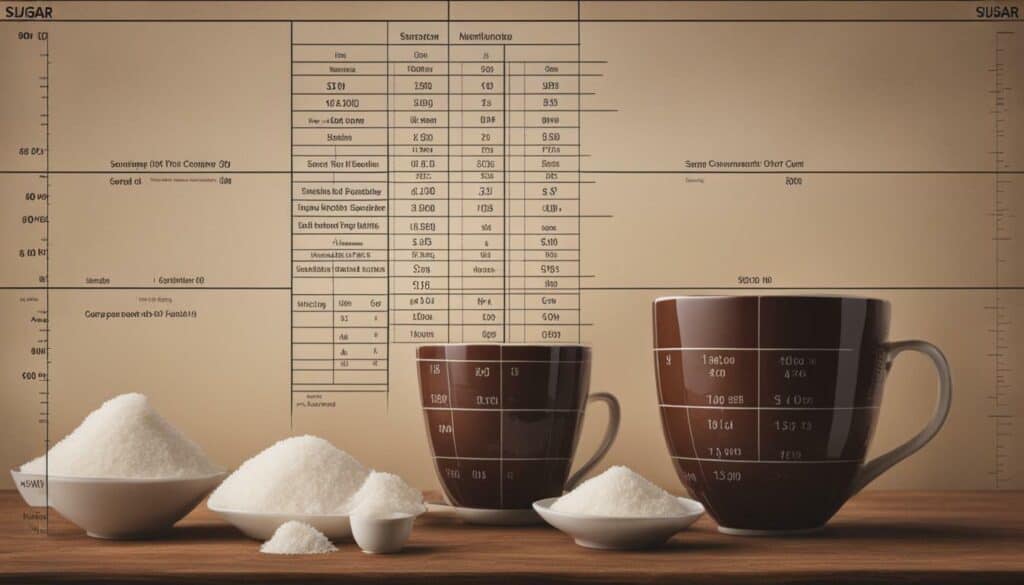
When converting 65 grams of sugar to cups, it is generally accepted that it is equivalent to around 1/3 cup, but keep in mind that this is an approximate measurement. The exact conversion can vary based on factors such as room temperature and the quality of the sugar. To ensure more precise results, it is recommended to use weight measurements like grams instead of relying solely on cups.
Using a kitchen scale for accurate measurements can make a significant difference in your cooking and baking. By weighing the sugar in grams, you can achieve more precise amounts and accurately follow your recipes. This level of precision is especially important when it comes to achieving the desired sweetness level in your dishes.
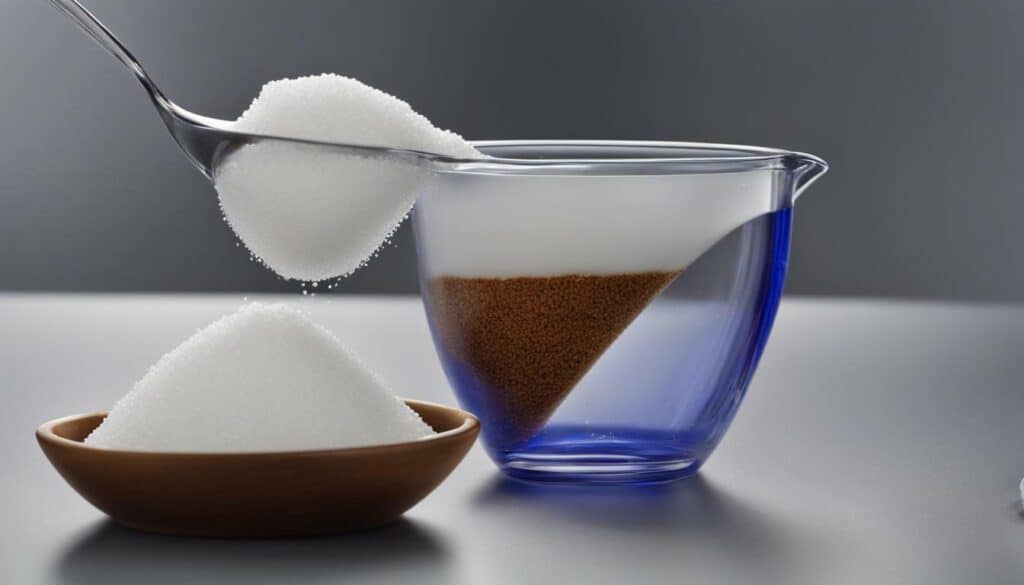
It’s also important to consider the different cup sizes used in various countries and measurement systems. Common cup sizes include US legal cups, metric cups, US customary cups, Canadian cups, and Imperial cups. Understanding the cup size being referred to in a recipe can help ensure accurate measurements and consistent results.
So, the next time you come across a recipe that calls for 65 grams of sugar, remember that it’s approximately 1/3 cup. However, for more precise measurements, it is recommended to weigh the sugar in grams using a kitchen scale. By doing so, you can achieve greater accuracy and create delicious dishes that are sure to impress!
The Importance of Weight Measurements in Baking
When it comes to baking, weight measurements such as grams are often more reliable than cup measurements for achieving consistent results. The density of ingredients can vary, and using weight measurements ensures accuracy and precision in your recipes. Cup measurements may not always provide the same level of accuracy, as the volume of ingredients can vary depending on factors such as how they are packed or sifted. Weight measurements, on the other hand, eliminate any ambiguities and ensure that you are using the exact amount of each ingredient.
By using weight measurements like grams, you can easily convert between different units and accurately measure ingredients for your recipes. A kitchen scale is an essential tool for any serious baker, as it allows you to measure ingredients with precision. Whether you are following a recipe or experimenting with your own creations, using weight measurements will help you achieve consistent and delicious results every time.
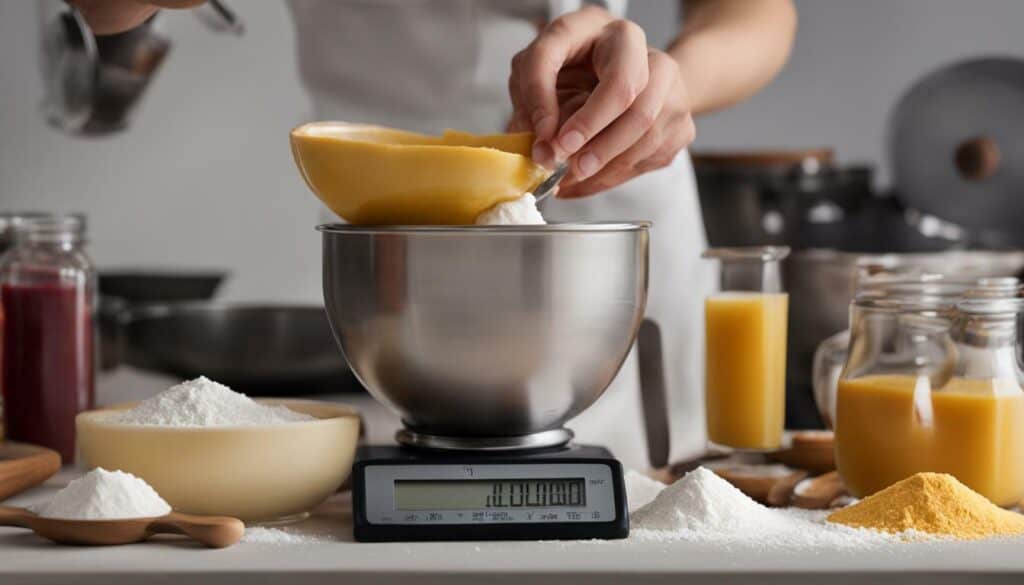
The Role of Kitchen Scales in Precision
A kitchen scale is an invaluable tool for achieving precise measurements in baking. By weighing your ingredients in grams, you can ensure that you are using the exact amount required in a recipe. This level of precision can make a significant difference in the final outcome of your baked goods. Whether you’re measuring sugar, flour, or other ingredients, a kitchen scale will help you achieve the perfect balance of flavors and textures.
In addition to providing accurate measurements, using a kitchen scale can also save you time and reduce the number of dishes to clean. Instead of measuring multiple cups and spoons, you can simply place your mixing bowl on the scale and add ingredients directly, zeroing out the weight after each addition. This streamlined process eliminates the need for multiple measuring tools and ensures that your measurements are always precise.
Summary:
- Weight measurements in grams are more reliable than cup measurements for achieving consistent baking results.
- Using weight measurements ensures accuracy and precision in recipes, eliminating any ambiguities.
- A kitchen scale is an essential tool for precise measurements in baking, allowing you to measure ingredients with accuracy and achieve consistent outcomes.
Table: Common Weight Measurements in Baking
| Ingredient | Grams | Ounces |
|---|---|---|
| Granulated Sugar | 200g | 7.05oz |
| All-Purpose Flour | 125g | 4.41oz |
| Butter | 225g | 7.94oz |
| Brown Sugar | 220g | 7.76oz |
| Baking Powder | 10g | 0.35oz |
Different Cup Sizes to Consider
Cup sizes can differ depending on the country or measurement system, so it’s crucial to know which cup size a recipe is referring to. Whether you’re using a recipe from the US, Canada, or another country, understanding the different cup sizes can help ensure accurate measurements and successful baking.
Let’s take a closer look at some of the commonly used cup sizes:
| Country/Measurement System | Cup Size |
|---|---|
| United States | US legal cups |
| Metric | Metric cups |
| United States | US customary cups |
| Canada | Canadian cups |
| United Kingdom | Imperial cups |
Each country or measurement system may have its own standard cup size for baking. It’s important to refer to the specific cup size mentioned in the recipe or use a conversion chart to ensure accurate measurements. This will help you achieve the desired results in your baking endeavors.
Remember, when it comes to baking, precision matters. Using the correct cup size can make a significant difference in the texture and taste of your baked goods.
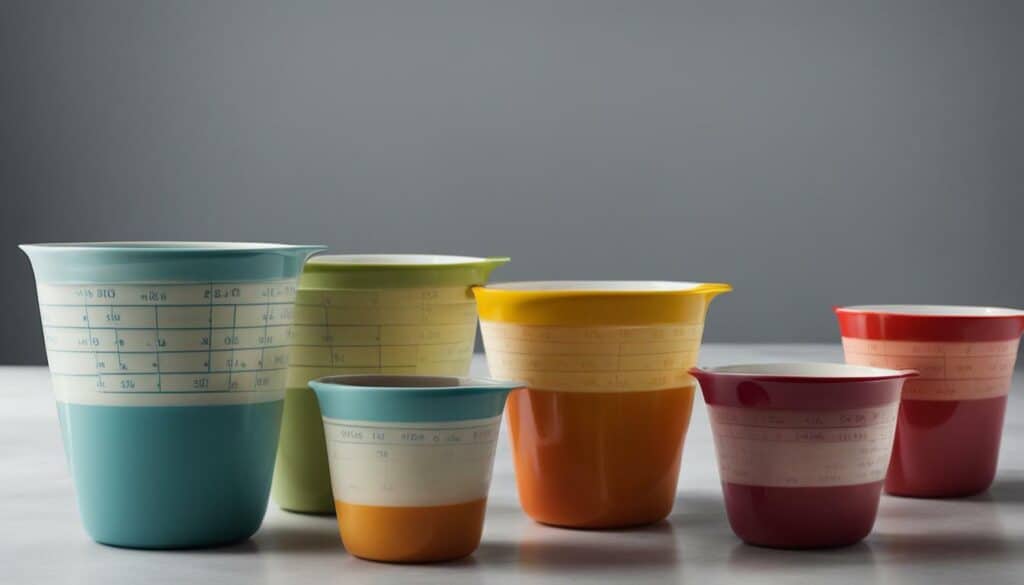
By understanding the differences in cup sizes and using the appropriate measurement for your recipes, you can confidently bake delicious treats that turn out just right every time.
The Role of Kitchen Scales in Precision
For the best accuracy in your baking measurements, using a kitchen scale to weigh ingredients is highly recommended. When it comes to achieving the perfect balance of flavors and textures in your recipes, precise measurements are crucial. A kitchen scale allows you to measure ingredients in grams, ensuring that you add the exact amount of sugar and other components needed for a successful bake.
By weighing your sugar in grams, you can eliminate any discrepancies that may occur when using cups. The density of sugar can vary, and this can affect the volume even when the weight remains constant. A kitchen scale provides a level of precision that cannot be achieved with cup measurements alone.
Not only does a kitchen scale help you achieve accurate measurements, but it can also streamline your baking process. With a scale, you can measure multiple ingredients without the need for multiple measuring cups. This saves time and reduces the number of dishes to wash, making your baking experience more efficient.
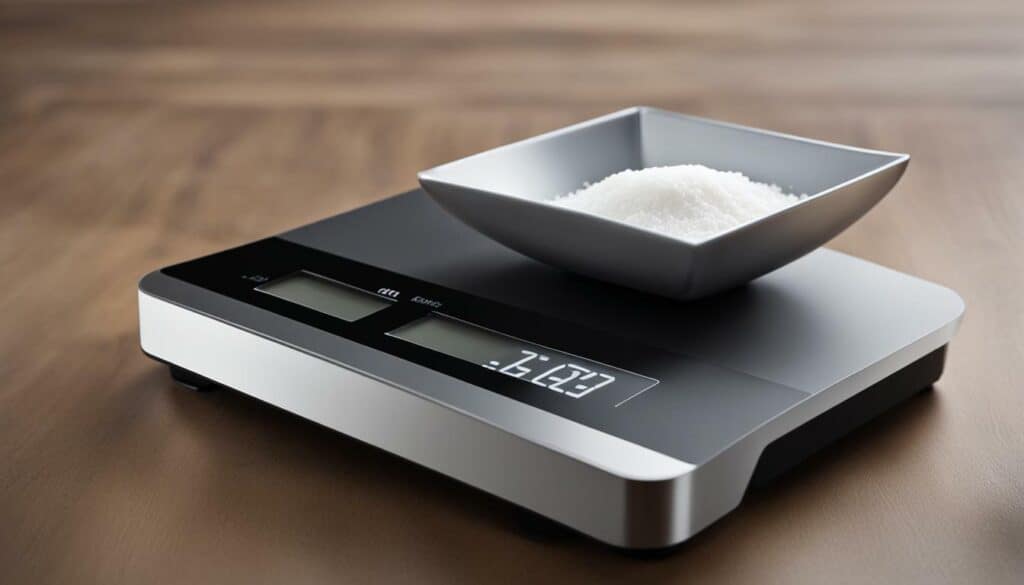
| Benefits of Using a Kitchen Scale: |
|---|
| Accurate measurements in grams |
| Consistency in your recipes |
| Streamlined baking process |
| More precise results in your baked goods |
Conclusion:
When it comes to achieving the best results in your baking, precision is key. A kitchen scale allows you to measure ingredients, such as sugar, in grams, ensuring accurate and consistent results. By using weight measurements instead of relying solely on cups, you can eliminate any variations in density and achieve the desired sweetness level in your recipes. Invest in a kitchen scale and elevate your baking game to a new level of precision.
Recommended Approach for Converting Sugar Measurements
To achieve precise sugar measurements, it’s best to use weight measurements in grams rather than relying solely on cups. Converting 65 grams of sugar to cups can be approximated as 1/3 cup, but keep in mind that the exact conversion may vary depending on factors such as room temperature and the quality of the sugar. The density of the sugar can also impact the accuracy of the conversion.
Using weight measurements like grams provides a more accurate way to measure ingredients, especially when it comes to achieving the desired sweetness level in your recipes. Investing in a reliable kitchen scale is highly recommended for obtaining precise measurements. With a kitchen scale, you can accurately measure the amount of sugar and other ingredients needed for your baking.
By using grams as a unit of measurement, you eliminate the potential inconsistencies that can arise from converting between different cup sizes used in various countries and measurement systems. This guarantees that your recipes will turn out as intended, regardless of which cup size is specified in the recipe.
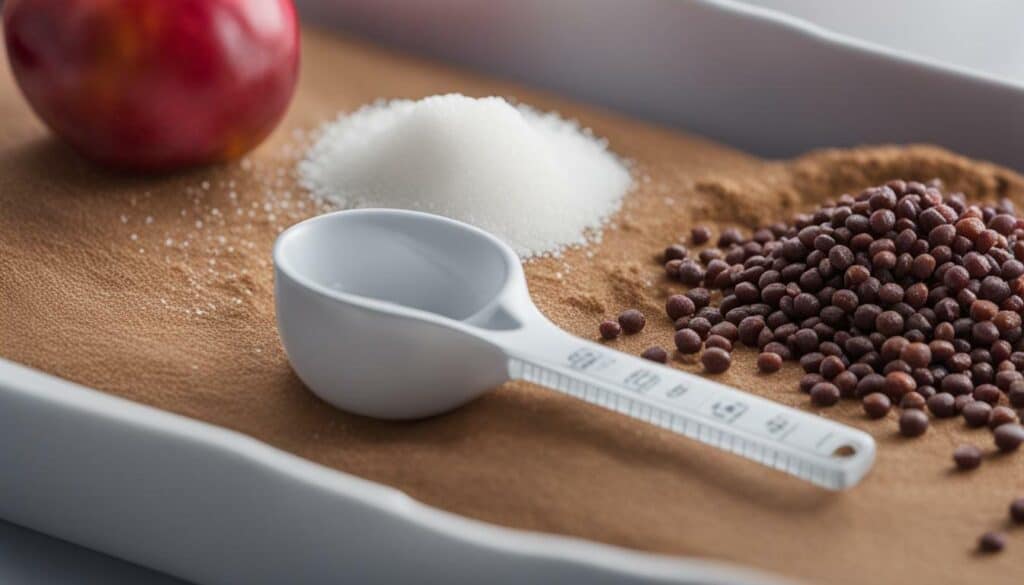
When it comes to baking, precision is key. By following the recommended approach of using weight measurements in grams for precise sugar measurements, you can elevate the quality of your baked goods and ensure consistent results every time. So, grab your kitchen scale and get ready to create delectable treats!
Tips for Successful Baking with Sugar
Achieving successful baking with sugar involves more than just accurate measurements – proper storage and fresh ingredients also play a crucial role. To ensure the best results in your sweet treats, consider the following tips:
- Store your sugar properly: Sugar has a tendency to clump when exposed to moisture, which can affect its texture and measurement accuracy. Keep your sugar in a sealed container in a cool, dry place to prevent clumping and maintain its freshness.
- Use fresh ingredients: When it comes to baking, using fresh ingredients can make a significant difference in the taste and texture of your final product. Check the expiration dates on your sugar and other baking ingredients to ensure optimal results.
- Experiment with different types of sugar: Sugar comes in various forms, such as granulated, powdered, brown, and specialty sugars like demerara or turbinado. Each type of sugar can add its own unique flavor and texture to your baked goods. Don’t be afraid to explore different options and find the perfect sugar for your recipes.
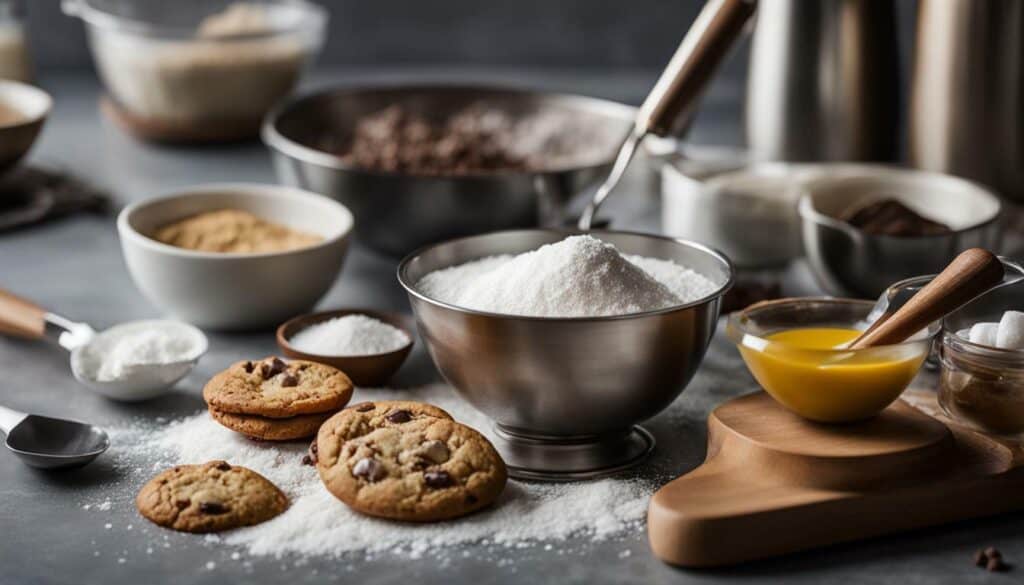
Baking is a creative process, and using sugar in the right way can enhance the taste and presentation of your sweet treats. Remember, accurate measurements, proper storage, and fresh ingredients are all key factors in achieving baking success. So, grab your measuring cups, fire up your oven, and create delicious baked goods that will leave everyone craving more!
Conclusion
Converting 65 grams of sugar to cups requires careful consideration of factors such as sugar density, cup size, and the use of weight measurements for accuracy. With the right approach and attention to detail, you can achieve delicious results in your baking endeavors.
Based on reliable sources and measurements, 65 grams of sugar is approximately equal to 1/3 cup. However, it’s important to note that this conversion can vary due to factors like room temperature and the quality of the sugar itself. To ensure more precise measurements, using weight measurements like grams and a kitchen scale is recommended.
It’s also crucial to be aware of different cup sizes used in various countries and measurement systems. Cup sizes can vary, so understanding which cup size a recipe refers to will help you obtain accurate measurements. Common cup sizes include US legal cups, metric cups, US customary cups, Canadian cups, and Imperial cups.
To achieve the best results in your baking, it’s essential to pay attention to these details. Consider the density of the sugar, different cup sizes, and the use of weight measurements to ensure accurate and consistent results. Following these guidelines will help you create scrumptious treats and impress with your baking skills!
FAQ
Q: How much is 65 grams of sugar in cups?
A: Approximately 1/3 cup.
Q: Does the conversion of 65 grams of sugar to cups vary?
A: Yes, factors such as sugar density and room temperature can affect the conversion.
Q: Why should I use weight measurements like grams for accurate sugar conversions?
A: Weight measurements provide more precise results due to variations in ingredient density.
Q: What are the different cup sizes to consider?
A: Common cup sizes include US legal cups, metric cups, US customary cups, Canadian cups, and Imperial cups.
Q: How can a kitchen scale help in achieving precise measurements?
A: A kitchen scale ensures accurate weights for ingredients, resulting in more precise recipes.
Q: What is the recommended approach for converting sugar measurements?
A: It is advisable to use weight measurements in grams for precise results and consider factors like sugar quality and room temperature.
Q: Are there any tips for successful baking with sugar?
A: Yes, store sugar properly to prevent clumping, use fresh ingredients, and experiment with different types of sugar for desired results.
Q: Can you provide a conclusion on converting 65 grams of sugar to cups?
A: Converting 65 grams of sugar to cups can be approximated as 1/3 cup, but considering factors such as sugar density and room temperature is important. Weight measurements provide more precise results, and using a kitchen scale can greatly improve accuracy. Additionally, it’s essential to be aware of different cup sizes used in various countries and measurement systems.
How Can I Convert Grams of Sugar to Cups for My Recipe?
Converting sugar to cups made easy! Want to adjust your recipe’s sugar measurement from grams to cups? Follow this simple conversion rule: for granulated sugar, 1 cup is roughly 200 grams. However, keep in mind that sugar’s density varies, so it’s always best to use a scale for accurate results.

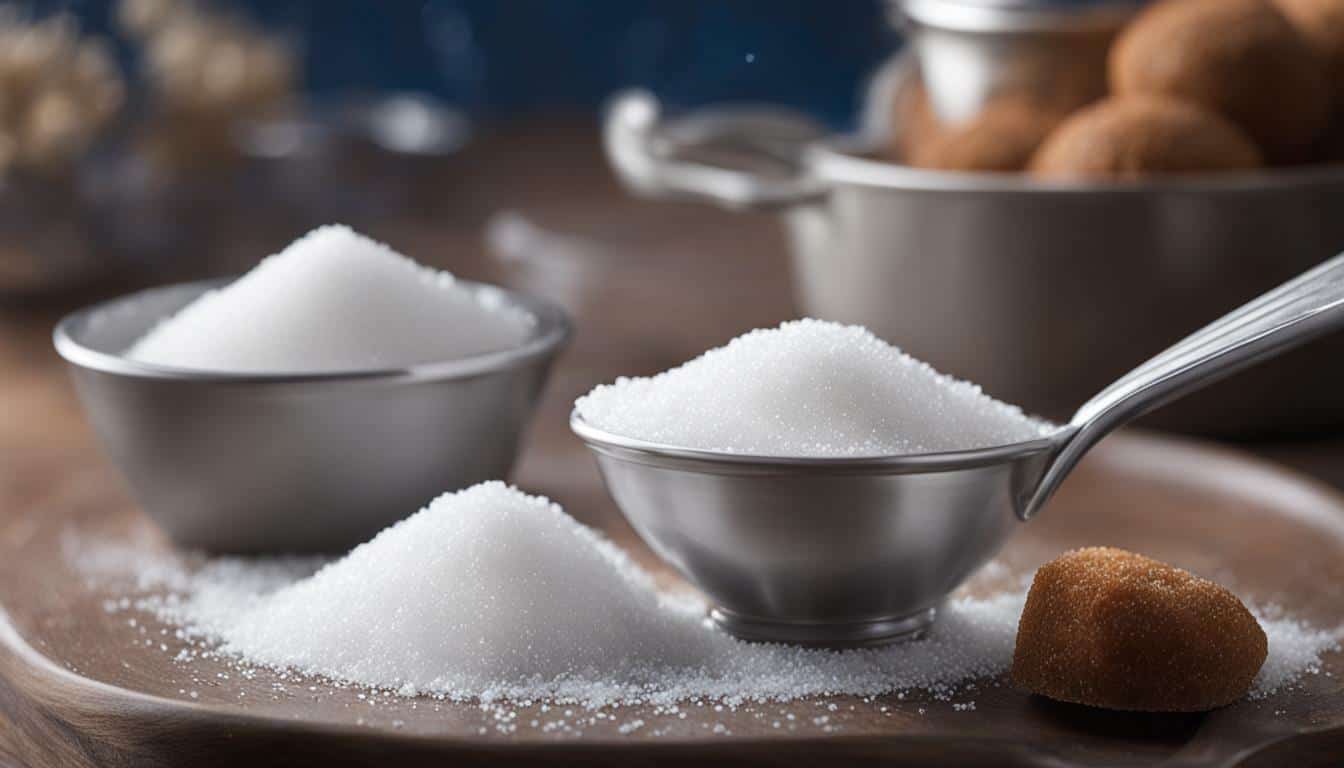



Leave a Reply